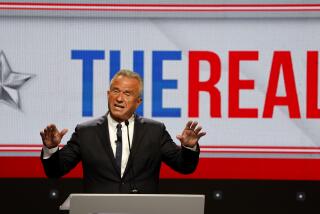Maverick Bids Usually Lead to Dead-End : Parties: When independents begin to gain acceptance, major rivals historically expropriate their most potent ideas.
- Share via
It has been 140 years since the Republican Party overtook the Whigs, and no new political party has achieved mainstream status since. But the 20th Century is littered with the political corpses of brave candidates who tried.
Historically, when third-party movements or independent candidacies began to gain acceptance, the major parties have simply expropriated their most potent ideas, said Leslie H. Southwick, author of the book, “Presidential Also-Rans and Running Mates.”
Presidential candidates running as independents or on third-party tickets have argued that the major parties ignore concerns of average Americans, Southwick said. Texas billionaire H. Ross Perot is making this point as he explores the prospects of an independent presidential candidacy. But for the past 80 years, the bottom-line for such campaigns has been deflating.
In 1912, Theodore Roosevelt ran for President as leader of the Progressive Party after the Republican Party rejected him and renominated President William Howard Taft. His “Bull Moose” ticket so split the GOP vote that Democrat Woodrow Wilson won.
In 1924, Robert La Follette again raised the Progressive Party standard against Republican Calvin Coolidge and Democrat John W. Davis. But La Follette got only 16.5% of the vote.
In 1948, Henry A. Wallace--who once had served as Franklin D. Roosevelt’s vice president--ran for President on the Progressive Party ticket, while South Carolina Sen. Strom Thurmond ran under the banner of the States’ Rights Party. Each got about a million votes--far behind the 24 million for Democratic President Harry S. Truman and the 22 million for Republican challenger Thomas E. Dewey.
The most successful third-party campaign in recent times was run by former Alabama Gov. George C. Wallace in 1968. He won 13.6% of the vote and carried five Deep South states in an election won by Richard M. Nixon.
In 1980, the independent candidacy of John B. Anderson polled 6.7% of the vote. But in many states, the votes he siphoned likely were crucial to Ronald Reagan’s margin over then-President Jimmy Carter. Without Anderson in the race, Reagan’s electoral vote landslide win might have been much closer.
More to Read
Get the L.A. Times Politics newsletter
Deeply reported insights into legislation, politics and policy from Sacramento, Washington and beyond. In your inbox twice per week.
You may occasionally receive promotional content from the Los Angeles Times.










